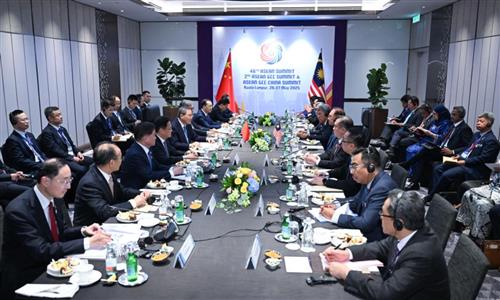Day out: (From left) Zhang, Xing and He exploring the city during their free time in George Town. — LIM BENG TATT/The Star
Affordable education and cultural ties fuel academic migration
GEORGE TOWN: Attracted by affordability, academic freedom and cultural familiarity, lecturers and researchers from China are drawn to Malaysia to further their scholarly pursuits.
Over 2,300 of them are working on their PhD research at Universiti Sains Malaysia (USM).
They now make up the majority of foreign nationalities in USM’s student population, along with over 3,700 others from China pursuing their master’s and bachelor’s degrees at USM, a sign that pursuing tertiary studies in Malaysia has become a popular option.
While the PhD candidates expressed satisfaction at being able to work on their research topics in Malaysia, they lamented how their tertiary degrees are “valued less” than those from Singapore or Hong Kong.
Lola He Ying Lei, 40, said: “In some parts of China, a PhD from Malaysia is seen as less prestigious than a mid-tier Chinese university. Some Chinese universities even reject the PhDs from South-East Asian universities of those applying for teaching jobs.
“Some in China view Singapore's qualification as higher than other countries in the region. They think Malaysia is an underdeveloped country,” she said.
However, He noted that this misconception tends to fade rapidly for those who visit Malaysia.
She is researching constructive journalism comparisons between China and Malaysia in news related to higher education institutions and noted that academic freedom in Malaysia was considerably greater.
“In sensitive disciplines like journalism, PhD candidates in China face strict ideological constraints and we must align our research with the supervisor’s direction.
“But at USM, our supervisors encourage us to explore and let our scholarly research evolve,” said the mother of two from Harbin in northeast China, 400km from the Russian border.
He expressed hope that the strengthening of Malaysia-China relations, along with the rising number of tourists and students from China, would lead to a shift in the perception of Malaysia within her home country.
Sharon Zhang Jing Lun, 32, is also revelling in her USM experience, pointing out that research freedom was often restrictive in China.
“At USM, the lecturers lend supportive supervision and flexible research environments that contrast with the rigid system in our country,” she said.
As a journalism lecturer in China, she gave up trying to secure a PhD candidacy in her homeland after being told to wait two or three years to even be considered.
She said in USM, the process was straightforward, and upon arriving, she found Malaysia to be culturally similar and felt right at home.
Zhang, from Shanxi province, is doing a comparative study on China and Malaysia’s media efforts in the control and prevention of the Covid-19 pandemic.
Xing Zhang, 33, an art expert from Shanxi, who is here to research the development and application of Pingyao lacquerware for tourist souvenir models, found affordability to be a key factor in choosing USM.
“The cost of studying is comparable to that in China; however, the living expenses in Malaysia are more financially manageable,” she said.
Xing described acceptance as a PhD candidate in China to be “extremely competitive” and professors there often took only one or two students per year.
The three individuals noted that socially, when interacting with Malaysia’s ethnic Chinese community, they perceive a distinct difference from the Chinese in China, particularly in terms of Mandarin accent and intonation.
“I can understand their Mandarin, but if I talk too fast, the Malaysian Chinese will not understand me,” Xing said.
USM disclosed that there are 2,302 PhD candidates from China on campus currently, and their main research areas are management, education, architecture and tourism, arts and design, and language and translation.
Another 2,469 are pursuing master’s degrees in the management, arts, communication and language fields.
A further 1,294 undergraduates from China are pursuing bachelor’s degrees in management, computer science, applied statistics and English for professionals at USM.
USM’s Assoc Prof Dr Nik Norma Nik Hasan from the School of Communication observed that the influx of China’s students to Malaysia began after 2020.
“Between 2016 and 2019, we would see only two to three Chinese pursuing master’s and PhD studies,” she said, adding that on campus now, the numbers from China surpassed all other foreign nationalities.
Assoc Prof Norma said she had several conversations with them about choosing Malaysia, and the most interesting response was that the students trusted their agents in China to advise them on which countries to choose for specific degrees.
“Their agents are very influential,” she added.
USM vice-chancellor Prof Datuk Seri Dr Abdul Rahman Mohamed said USM’s global recognition and rankings were a major appeal.
“We are ranked 18th in the Times Higher Education University Impact Rankings (1st in Malaysia and South-East Asia) and 146th in QS World University Rankings.
“USM is the only Malaysian university holding the Accelerated Programme for Excellence title and one of the five research- intensive universities in the country,” he said.
Prof Abdul Rahman said almost all courses at USM are taught in English, cutting down language barriers for China’s students.
“Tuition fees and living costs are significantly lower than in countries such as the United States, the United Kingdom and Australia.
“Our multicultural nation makes it easy for China’s students to feel at home,” he said.
Related:
 'ASEAN regards China as a valued friend,' Malaysia PM says ahead of landmark trilateral summit: report
'ASEAN regards China as a valued friend,' Malaysia PM says ahead of landmark trilateral summit: report




